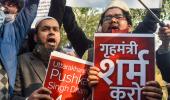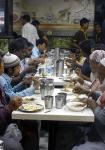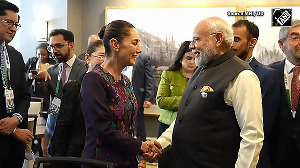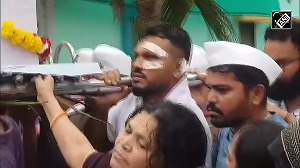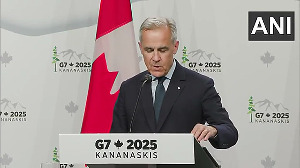Making citizens queue to vote just when the disease is declining, but is still in the air, could just cause a fresh spurt.
The logic for this scheduling is inexplicable, especially since the entire process could so easily have been pushed back by three weeks, argues David Devadas.

Polling for the various assembly elections that are due soon should have been held at the end of February and during the first third of March.
Constituency-wise campaigning for these elections could then have hoped to avoid the current Covid wave.
Since constituency-wise campaigns are conducted for a fortnight ending two days before the polling day, a schedule that concentrated all polling after around February 25 would have catered for campaigning to get going in right earnest only around February 10, when we might expect the current Omicron-variant-driven Covid wave to be declining.
Omicron trajectory elsewhere
Judging by the South African and UK experiences, the Omicron-driven wave could zoom exponentially for a little more than three weeks and then go as sharply down over the next three to four weeks.
It began in South Africa, where it was first noted, around November 23, 2021, and peaked on December 16. Disease incidence began to rise sharply in the UK from December 13, and appears to have peaked on January 5.
If Omicron follows that sort of trajectory in India, too, it might be over some time between February 15 and 20. Since this wave began at the tail-end of December in several parts of the country, it is possible that it will soar exponentially until around January 20, and then decline as sharply -- all during a seven-week period.
Preliminary campaign now
The Election Commission's timetables provide for a fortnight's campaign after the last date for withdrawal of candidature, after which the final slate for each constituency is declared.
The current phase of campaigning by major leaders of some parties is preliminary, meant to influence voters across these states rather than in each constituency. That would be done, mainly by candidates and their workers, after the lists are finalised.
There is no reason for counting of votes to be planned after a gap following the last phase of voting. The last phase of polling could therefore have been scheduled just a day before counting, which the commission has fixed for March 10.
Inexplicable gap between voting and counting
By fixing the entire polling in three states -- Punjab, Uttarakhand, and Goa -- on February 14, the Election Commission has ensured that campaigning will end on February 12, and officially begin in those states at the end of January, when the current Covid variant may still be strongly in the air.
The current wave began to climb in all those three states around December 28. We could therefore hope that it might peak by around January 20 in these states, and be almost over around the date on which polling has been fixed.
Making citizens queue to vote just when the disease is declining, but is still in the air, could just cause a fresh spurt. The logic for this scheduling is inexplicable, especially since the entire process could so easily have been pushed back by three weeks.
Since the votes polled in these three states are to be counted on March 10, along with the votes cast in the other states where elections are being held, citizens in these three states ought to have been asked to vote in early March, preferably around the seventh or eighth of that month.
Not only would that have most likely avoided this Covid wave, it would have reduced speculation about potential tampering with voting machines during such an inordinately long gap between voting and counting.
At least to my mind, the logic for fixing the voting date so long before the date of counting just doesn’t make sense.
There would have been an additional advantage to fixing later dates. For, starting the scheduled constituency-wise campaign in mid-February would have avoided the biting cold of January and early February in mountainous Uttarakhand.
Some parts of that state are barely accessible in midwinter. Snow causes road blockages, making it tough for campaigners as well as officials to reach their destinations. January is the worst month for that.
Even Punjab is in the grip of an extraordinarily cold winter.
Is Goa's carnival a factor?
As for Goa, even if the Commission wanted to get polling done before that state's traditional annual carnival, which is slated for the last three days of February this year, polling could have been held in that state between February 20 and 25.
That way, the scheduled fortnight of campaigning could have begun around the time the Covid wave might be expected to be petering out.
In any case, it is possible that the carnival could be severely restricted this year, owing to the pandemic.
Fewer phases would have sufficed
The Election Commission has seen fit to conduct elections in Uttar Pradesh in seven phases, starting from February 10.
There is an argument for staggering elections in such a large state, for UP is projected to have the world's fifth largest population if it had been a separate country. However, it would have been quite enough to have conducted polling in four or five phases starting after February 20.
Indeed, if all the polling in each of the concerned states had been held in early March (except perhaps Goa, owing to its carnival), the fortnight of official campaigning might perhaps have avoided the current Covid wave in each of them.
Last year's example
The Election Commission and the Union home ministry, which often advises the Commission on the advantages or disadvantages of particular dates, could have learnt a lesson from the fact that last year's assembly election campaigns contributed to driving the devastating 'second wave'.
It can be argued that one couldn't predict that that Delta variant-driven wave would engulf India during those assembly elections. But since the Omicron variant-driven 'third wave' had obviously taken off before this year's assembly election dates were announced on January 8, the likely trajectory of this 'wave' should have been taken into account.




